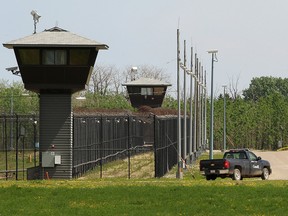Edmonton groups call to end 'privatization' of chaplain services in federal prisons
Both the NCCM and IFSSA called Tuesday for the correctional service to return to its pre-2013 system, which they argue better involved local faith communities in the care and reintegration of offenders.

Article content
Two Muslim community groups say the privatization of chaplain services in federal prisons has led to poorer quality spiritual care for minority faith inmates.
Outside Edmonton’s Canada Place on Tuesday, the National Council of Canadian Muslims (NCCM) and the Islamic Family & Social Services Association (IFSSA) released research critical of Bridges of Canada, the company that provides pastors, imams, rabbis and other faith leaders for Correctional Service Canada.
Adar Abdulkadir, an instructor in the justice program at NorQuest College who wrote her master’s thesis on the move to private chaplaincy services, said chaplains she interviewed are “emotionally exhausted” and “incredibly frustrated” with the current system.
“The chaplains’ role used to be being in the institution, but not of the institution,” she said in an interview. “Having a contract, competitively bidding for a contract with Correctional Service Canada, compromises their ability to challenge Correctional Service Canada.”
Historically, regional chaplains affiliated with CSC were responsible for contracting with local faith communities to hire, train and oversee chaplains for service in federal prisons, Abdulkadir’s report says.
That changed in 2013, when the federal Conservative government first awarded a prison chaplaincy contract to a private company after cutting loose around 50 part-time minority faith chaplains.
The first contract went to Kairos Pneuma Chaplaincy Inc., a company started by current and former federal prison chaplains in response to a request for proposals. Bridges of Canada later took over chaplaincy services for the entire federal system, Abdulkadir said.
As a criminology masters student at Simon Fraser University, and later as research lead with IFSSA, Abdulkadir set out to interview minority faith chaplains about the change. She eventually spoke with 10 current and former chaplains representing four faith groups across five provinces, as well as seven minority faith former inmates.
They described a system that had become bureaucratized, cut off from their broader faith communities and unable to challenge injustices within the system.
“There was just an overwhelming negative perception,” Abdulkadir said. “There were so many negative consequences of privatizing the services that really placed minority groups at a disadvantage.”
Among those consequences are reduced levels of service for inmates. Chaplains Abdulkadir interviewed told her they could not visit institutions with fewer than a certain number of inmates of a particular faith, “(so) if there’s two people, let’s say, who are Hindu, then a Hindu chaplain can’t go. That’s not enough.”
She also said Muslim chaplains reported not having their hours adjusted during Ramadan, one of the most significant months in the Islamic calendar.
“Most of the chaplains I spoke with said ‘we haven’t been in a women’s institution in years,’ because of that minimum requirement, and the lack of flexibility in how they can spend their time,” she said.
One chaplain Abdulkadir interviewed told her that many who do faith work in prisons believe they’ve been hired to meet minimum standards under the law.
“That’s all (the correctional service) wants: they just want us to cover their butts, meet that charter requirement,” she summarized. “We’re not allowed to actually, you know, really be a part of the rehabilitation process anymore.”
Both the NCCM and IFSSA called Tuesday for the correctional service to return to its pre-2013 system, which they argue better involved local faith communities in the care and reintegration of offenders. Abdulkadir said the current contract with Bridges of Canada ends at the end of June.
In a statement, Bridges of Canada vice president Lana Lewis Swim said the organization was “unaware” of the allegations raised by NCCM and IFSSA.
“We have successfully been providing multi-faith chaplaincy services for Correctional Services Canada for six years,” she said in an email, adding the organization is “very passionate and committed to providing quality spiritual care for all individuals within CSC institutions across Canada.”
Postmedia also reached out to Correctional Service Canada for comment.






Postmedia is committed to maintaining a lively but civil forum for discussion. Please keep comments relevant and respectful. Comments may take up to an hour to appear on the site. You will receive an email if there is a reply to your comment, an update to a thread you follow or if a user you follow comments. Visit our Community Guidelines for more information.